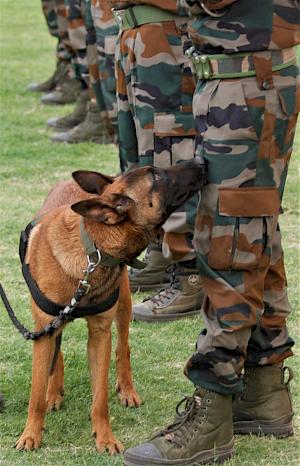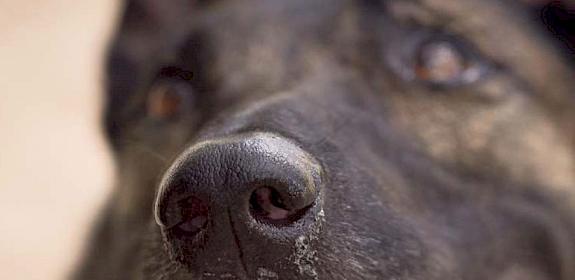106 and Not Out: Sniffer Dogs Tackling Wildlife Poaching Passes 100 As Newest Recruits Graduate
The latest canine cadets to curb the illegal poaching of wild animals graduated with flying colours today. This has increased the total number of wildlife sniffer dogs trained under TRAFFIC and WWF-India programme in India to 106.
The 12 wildlife sniffer dog squads completed their training at the Basic Training Centre, Indo-Tibetan Border Police Force (BTC-ITBP) camp in Panchkula. These young dogs and their 24 handlers will strengthen the protection of India’s wildlife from poaching and illicit trade. The dogs can achieve incredible levels of detection, from tracking poachers from the forest to their hideouts and locating hidden traps and wildlife contraband.
It is a proud moment for us as we complete training over 100 wildlife sniffer dogs in India.”
Dr Dipankar Ghose, Senior Director, Biodiversity Conservation, WWF-India, and Interim-Head, TRAFFIC’s India office.
 “TRAFFIC and WWF-India’s wildlife sniffer dog training programme was launched in 2008 with just two dogs. It has come a long way in helping establish the role of sniffer dogs for wildlife crime prevention and detection. While these wildlife sniffer dogs are currently deployed by the state Forest Departments and the Railway Protection Force, other law enforcement agencies combating wildlife smuggling and illegal trade such as SSB and Customs may also explore their use”, added Dr Ghose.
“TRAFFIC and WWF-India’s wildlife sniffer dog training programme was launched in 2008 with just two dogs. It has come a long way in helping establish the role of sniffer dogs for wildlife crime prevention and detection. While these wildlife sniffer dogs are currently deployed by the state Forest Departments and the Railway Protection Force, other law enforcement agencies combating wildlife smuggling and illegal trade such as SSB and Customs may also explore their use”, added Dr Ghose.
Inspector General, BTC-ITBP, Panchkula Haryana, said “We congratulate TRAFFIC and WWF-India for crossing a significant milestone of 100 wildlife sniffer dogs. BTC-ITBP, Panchkula has been associated with this pioneering programme since its inception and we provide support in training the wildlife sniffer dogs by incorporating modern training techniques specifically designed to address challenges related to curbing illegal wildlife trade.”
In November last year, the new batch of 12 dogs and their 24 handlers started their training at the Basic Training Centre, Indo-Tibetan Border Police Force, Panchkula, Haryana. The young dogs of 6-9 months of breed Belgian Malinois and their handlers from forest departments of seven states underwent specialised training for seven months, learning skills to help detect and curb wildlife crime.
The wildlife sniffer dog training programme at BTC-ITBP was divided into two critical phases. The first phase focused on developing an emotional and trusting bond between the dog and the handler, which is crucial to becoming a successful wildlife sniffer dog squad. It was followed by basic obedience training. Later, the dogs learnt sniffing and tracking skills and were trained to detect illegal wildlife products.
Contraband detection drills, curated to simulate real-life scenarios as closely as possible, were also conducted during the training. For instance, conducting searches to detect and indicate the presence of wild derivatives among baggage, vehicles, and people.
The new wildlife sniffer dog squads will now join the forest departments of Uttarakhand (4), Odisha (2), Chhattisgarh (2), Jharkhand (1), Madhya Pradesh (1), Maharashtra (1), and West Bengal (1). They will be deployed at Similipal Tiger Reserve in Odisha; Palamu Tiger Reserve in Jharkhand; Pench Tiger Reserve in Maharashtra; Kanha Tiger Reserve in Madhya Pradesh; Buxa Tiger Reserve in West Bengal; Gomardha Wildlife Sanctuary in Chhattisgarh; and Kalagarh Division, Corbett Tiger Reserve, and Rajaji Tiger Reserve in Uttarakhand.
Dr Merwyn Fernandes, Associate Director, TRAFFIC’s India Office said, “We extend our gratitude to the three training centres associated with this programme namely the Basic Training Centre, Indo-Tibetan Border Police Force (BTC-ITBP), Panchkula, Haryana; National Training Centre for Dog (NTCD), BSF Academy, Tekanpur Gwalior, Madhya Pradesh; and 23rd Battalion Special Armed Force Police Dog Training Centre, Bhopal, Madhya Pradesh and for being with us for more than a decade”.
"We are confident that the new batch of 12 sniffer wildlife sniffer dog squads will play a huge role in protecting India’s wild flora and fauna just like their counterparts already deployed in the field”, adds Dr Fernandes.
Notes:
The illegal wildlife trade has endangered the existence of many wild species across the globe. In India, it includes the illegal trade of products like mongoose hair; snake skins; rhino horn; tiger and leopard claws, bones, skins, whiskers; elephant tusks; deer antlers; shahtoosh shawl; turtle shells; musk pods; bear bile; medicinal plants; timber and caged birds such as parakeets, mynas, munias, etc. There is an urgent need for action to stop all illegal wildlife trade that has threatened and even pushed many species towards extinction. Training wildlife sniffer dogs is a step forward in this direction.




